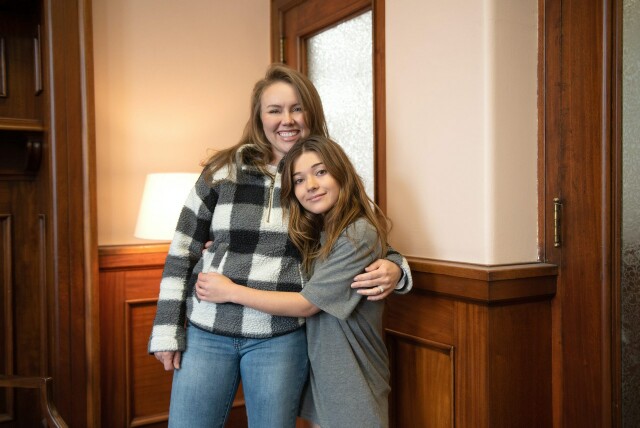Lifetime Examines Abduction and Survival with "The Girl Who Escaped: The Kara Robinson Story"

In June of 2002, what began as a sleepover would turn into an 18-hour ordeal that would be life-changing for then-15-year-old Kara Robinson. While watering her friend's garden, before heading out on a trip, she was abducted at gunpoint, placed in a plastic container, bound, gagged and driven to an unknown location where she was abused by her captor. This weekend Lifetime recounts her harrowing ordeal in The Girl Who Escaped: The Kara Robinson Story. (Robinson is pictured at top, left, with Katie Douglas, the actress who portrays her.) The intent of this movie, which is the latest entry in the network's continuing ripped-from-the-headlines film franchise, is to illustrate how some survivors choose to navigate both the ordeal and its aftermath. Helping bring the story to the screen is fellow kidnapping survivor Elizabeth Smart, who serves as an executive producer. When deciding to relive her ordeal, Robinson (now Robinson Chamberlain, a mother of two) had one thing in her mind -- authenticity.
"What's important is telling a story that's authentic to what I actually experienced," she explained while promoting the project. "But one of the things that Elizabeth and I have both identified, in our journey towards healing and being survivors of crime stories, is that we did not see anyone in the media experiencing a traumatic event in the way we were experiencing it.
"For me, I think what's most important is telling a story that might look a little different than some of the stories you've seen on television," she continued. "[Like] how I responded, how I reacted … because ultimately I know that I'm not alone in how I responded to my particular trauma."
As the film depicts, following her ordeal and subsequent escape, Robinson refused to let the ordeal identify her -- choosing, in a way, to become a statistic rather than a victim. That resilient appearance, coupled with a simple desire to return to normalcy, was misconstrued by those closest to her who were concerned in leu of the events. "This was 20 years ago," Robinson explained. "The only responses that I had seen portrayed in the media was this extremely traumatized reaction of having PTSD or having anxiety attacks and nightmares. That was never something that I identified with personally. Immediately following my kidnapping, I felt, 'I was fine,' and that was sort of a story I perpetuated for about 15 years."
"I feel sharing stories is such a powerful tool," added Smart. "Making sure that we are authentic to the voice of the survivor is key. But as I've met with other survivors, and listened to their stories, so many of them have been influenced by stories they've seen [in] the media. Crimes of sexual violence are so isolating, and it's so easy to feel alone. I feel like these stories are powerful in allowing other survivors to know they're not alone … that they don't have to be ashamed and keep it a secret. Whether it's on a very intimate small scale, or something large that the whole world knows about, I want them to know that they don't need to be ashamed. You can move on. I feel Kara's story illustrates that beautifully."
"I'm a very strong-willed and stubborn person," added Robinson. "I decided pretty quickly that I did not want the person that took me captive to have any more control over me than he possibly could. So, anything I could do to maintain control … that was me remaining calm, that was me escaping, and that was me going forward and not being a victim."
While the film doesn't dwell on the sexual abuse inflicted on Robinson, it deals heavily with how she coped in those terrifying moments she was held captive and summoned these tools to deal with it: Follow the rules. Wait. Gather information. Escape. And remember every single detail of your surroundings that you possibly can. "You hear 'fight or flight' very often," she said. "That's [now] been expanded when under stress. We now say, 'fight, flight, freeze and appease.' That's something in all of us when we face a traumatic situation. I share that with people as a way to empower them.
"I'd never considered myself to have a strong memory or anything like that," she continued. "But under immense stress, I was able to memorize a lot of facts. I had [my] mantra, which you see in the movie, so it was just kind of ruminating on those things as a lot was going on that I had no control over. What I did have control over was my ability to compartmentalize what was happening and put it somewhere else in my mind. Then I was able to gather information, gain this person's trust a little, and eventually escape. Those are the things that helped me."
"I'd agree with Kara," Smart concurred. "Initially it was trauma response. I mean I was gone for nine months. It did just eventually turn into, 'What happens if I don't do this? What happens if I do this? Will I survive? Will I live to see another day if I do this?' I just kept asking myself [those] questions all the time and that's how I made my decisions.
"That's how I gauged whether or not I should try to make a break for freedom, or if I should continue to do what they were saying," she added in closing. "What my life came down to was, will this help me survive? Will I die if I don't do this? And that's what I did."
The Girl Who Escaped: The Kara Robinson Story will be telecast Saturday, February 11 at 8 p.m. ET on Lifetime.
Click the social buttons to share this content with your friends and colleagues.
The opinions and points of view expressed in this content are exclusively the views of the author and/or subject(s) and do not necessarily represent the views of MediaVillage.com/MyersBizNet, Inc. management or associated writers.


